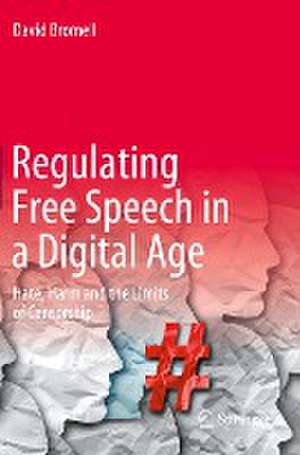Regulating Free Speech in a Digital Age: Hate, Harm and the Limits of Censorship
Autor David Bromellen Limba Engleză Paperback – 13 feb 2023
Written by a public policy advisor for fellow practitioners in politics and public life, this book discusses significant practical and moral challenges regarding internet governance and freedom of speech, particularly when responding to content that is legal but harmful. Policy makers and professionals working for governmental institutions need to strike a fair balance between protecting from harm and preserving the right to freedom of expression. And because merely passing laws does not solve complex social problems, governments need to invest, not just regulate. Governments, big tech and the private sector, civil society, individual citizens and the fourth estate all have roles to play, and counter-speech is everyone’s responsibility.
This book tackles hard questions about internet governance, hate speech, cancel culture and the loss of civility, and illustrates principled pragmatism applied to perplexing policy problems. Furthermore, it presents counter-speech strategies as alternatives and complements to censorship and criminalisation.
| Toate formatele și edițiile | Preț | Express |
|---|---|---|
| Paperback (1) | 361.75 lei 3-5 săpt. | +17.40 lei 4-10 zile |
| Springer International Publishing – 13 feb 2023 | 361.75 lei 3-5 săpt. | +17.40 lei 4-10 zile |
| Hardback (1) | 459.98 lei 3-5 săpt. | +23.72 lei 4-10 zile |
| Springer International Publishing – 12 feb 2022 | 459.98 lei 3-5 săpt. | +23.72 lei 4-10 zile |
Preț: 361.75 lei
Preț vechi: 435.84 lei
-17% Nou
Puncte Express: 543
Preț estimativ în valută:
69.23€ • 72.01$ • 57.15£
69.23€ • 72.01$ • 57.15£
Carte disponibilă
Livrare economică 25 martie-08 aprilie
Livrare express 08-14 martie pentru 27.39 lei
Preluare comenzi: 021 569.72.76
Specificații
ISBN-13: 9783030955526
ISBN-10: 3030955524
Pagini: 229
Ilustrații: XXI, 229 p. 2 illus., 1 illus. in color.
Dimensiuni: 155 x 235 x 31 mm
Greutate: 0.36 kg
Ediția:1st ed. 2022
Editura: Springer International Publishing
Colecția Springer
Locul publicării:Cham, Switzerland
ISBN-10: 3030955524
Pagini: 229
Ilustrații: XXI, 229 p. 2 illus., 1 illus. in color.
Dimensiuni: 155 x 235 x 31 mm
Greutate: 0.36 kg
Ediția:1st ed. 2022
Editura: Springer International Publishing
Colecția Springer
Locul publicării:Cham, Switzerland
Cuprins
Chapter 1. Introduction: After Christchurch.- Part I. Regulating Harmful Digital Communication.- Chapter 2. Challenges in Regulating Online Content.- Chapter 3. The Business Models of Big Tech.- Chapter 4. Deplatforming and Democratic Legitimacy.- Part II. Hate, Harm and the Limits of Censorship.- Chapter 5. Regulating “Hate Speech”.- Chapter 6. Free Speech and its Limits.- Chapter 7. Hate, Harm and the Liberal State.- Chapter 8. Striking a Fair Balance When Regulating Free Speech.- Chapter 9. Counter-speech is Everyone’s Responsibility.- Chapter 10. Conclusion: Cleaning Up After the Party.
Notă biografică
David Bromell worked in senior policy advice roles in New Zealand’s central and local government from 2003 to 2020. He is a Senior Associate of the Institute for Governance and Policy Studies in the School of Government at Victoria University of Wellington, and an Adjunct Senior Fellow in the Department of Political Science and International Relations at the University of Canterbury. His research on hate, harm and the limits of censorship was conducted as a Fellow at the Center for Advanced Internet Studies in Bochum, Germany, from October 2020 to March 2021.
Textul de pe ultima copertă
Hateful thoughts and words can lead to harmful actions like the March 2019 terrorist attack on mosques in Christchurch, New Zealand. In free, open and democratic societies, governments cannot justifiably regulate what citizens think, feel, believe or value, but do have a duty to protect citizens from harmful communication that incites discrimination, active hostility and violence.
Written by a public policy advisor for fellow practitioners in politics and public life, this book discusses significant practical and moral challenges regarding internet governance and freedom of speech, particularly when responding to content that is legal but harmful. Policy makers and professionals working for governmental institutions need to strike a fair balance between protecting from harm and preserving the right to freedom of expression. And because merely passing laws does not solve complex social problems, governments need to invest, not just regulate. Governments, big tech and the private sector, civil society, individual citizens and the fourth estate all have roles to play, and counter-speech is everyone’s responsibility.
This book tackles hard questions about internet governance, hate speech, cancel culture and the loss of civility, and illustrates principled pragmatism applied to perplexing policy problems. Furthermore, it presents counter-speech strategies as alternatives and complements to censorship and criminalisation.
Written by a public policy advisor for fellow practitioners in politics and public life, this book discusses significant practical and moral challenges regarding internet governance and freedom of speech, particularly when responding to content that is legal but harmful. Policy makers and professionals working for governmental institutions need to strike a fair balance between protecting from harm and preserving the right to freedom of expression. And because merely passing laws does not solve complex social problems, governments need to invest, not just regulate. Governments, big tech and the private sector, civil society, individual citizens and the fourth estate all have roles to play, and counter-speech is everyone’s responsibility.
This book tackles hard questions about internet governance, hate speech, cancel culture and the loss of civility, and illustrates principled pragmatism applied to perplexing policy problems. Furthermore, it presents counter-speech strategies as alternatives and complements to censorship and criminalisation.
Caracteristici
Written by a policy practitioner for policy advisors, regulators, NGO researchers and journalists Analyses practical and moral challenges of regulating free speech in a digital age Presents counter-speech strategies as alternatives and complements to censorship and criminalisation
